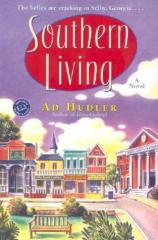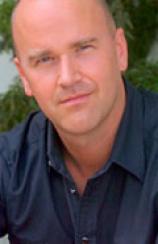Author Talk: August 2003
August 2003
After moving to the "beautiful, quirky city" of Macon, Georgia with his wife, journalist and stay-at-home dad Ad Hudler was inspired to write fiction. In this interview Hudler discusses in great detail the various themes and characters present in his two novels, HOUSEHUSBAND and SOUTHERN LIVING. He also talks about the origin of his first name and the authors who have influenced him the most.
Q: Where does the name "Ad" come from?
AH: My full name is Adrian Wellington Hudler, but I actually got the name by mistake. When my mother was pregnant with me, my great-grandfather and namesake had just died, and my mom promised his wife that, if I were a boy, she would name me after him. The problem was that my mother thought his name was Bill. His wife had called him "Welly", short for Wellington, and people assumed she was calling him Willy. They took it upon themselves to shorten it to Bill. My mom swears she had no idea until they handed her my birth certificate in the hospital, and she quickly truncated it into something she liked.
Q: In both of your novels, food plays a prominent role. You even compare one man to a stalk of broccoli and a scar's shape to uncooked linguini. Where does this come from?
AH: Meal planning is a big part of my life as a caregiver. I spend a lot of time in the kitchen so it's one of the few worlds I know really well. I'm also a sensual person. I especially notice smells. Perhaps I was poisoned in a previous life. Maybe that's why I smell everything first, as does Margaret, my character in SOUTHERN LIVING.
Q: Let's talk about the role gender plays in both of your novels. In HOUSEHUSBAND, Linc is a stay-at-home dad who gets in touch with his feminine side. Many male authors have trouble writing from a female perspective yet you chose to delve deeper still into the female psyche with a book in which the three main characters are all female. What were you thinking?
AH: Women are more interesting creatures than men. Women are more complex. They express themselves better. They're not as linear in behavior and in the way they process information. They are tuned in to subtle nuances. My next novel, however, will be from the white male's perspective. I need a break.
Q: Were there any aspects of writing from a female perspective that gave you particular trouble?
AH: The only parts that were hard for me were writing about makeup and the research I had to do to describe what a female orgasm feels like. I thank my wife and female friends for their candor.
Q: You began your writing career as a journalist, albeit one drawn to offbeat subjects, such as the love lives of lizards and why single shoes wind up on roadsides. What caused you to change genres? Do you find your newspaper and magazine experience help you as a novelist?
AH: I was drawn to fiction because I was home taking care of a child and it was the kind of writing I could do in the wee hours of the morning. Being a journalist has helped me a lot in that journalists are armchair anthropologists. They're taught to scrutinize and look at culture from afar.
Q: One technique you used as a journalist seems evident in both books. You draw the reader an intricately crafted world, created from lots of small details woven into the narrative. What attracts you to them?
AH: I'm obsessed with visual details. At writer's conferences I sometimes even teach a seminar called "Collectively Creating a Character." I truly believe the details people surround themselves with - whether they use an electric toothbrush, the kind of car they drive, what they cook for breakfast --- these things are more telling than what a character will say because frequently what we tell others are wonderful little lies. I like including details about characters because it lets the reader decide for him or herself very slowly what that person is like.
Q: What prompted you to write HOUSEHUSBAND?
AH: I was at a writer's conference, talking in a small group about character development, when the topic somehow turned to potty training. Suddenly, I found myself surrounded by about ten women who were watching me with great interest and laughter. "Your life is hilarious," they said. "This is the novel you need to write first." I replied, "I I do not want to write about my life. My life is Mr. Rogers and Big Bird and folding the red load. Why would I want to write about my life?" Nudged by my friends, I reluctantly agreed.
Q: What research was necessary to write the book?
AH: Life in a woman's world. Period. I complied my research at the McDonald's Playland by my house and in the line at the grocery store and over beers and wine with my good female friends. People have wondered how I managed to portray women's feelings so accurately. The truth is, these feelings were my own. I guess I've learned that many traditional female traits and behaviors, including so-called "women's intuition," are actually survival skills learned on the job.
Q: So are you saying HOUSEHUSBAND is autobiographical?
AH: I'm saying it's emotionally autobiographical. Yes, many of the father-daughter scenes truly did happen --- including that awful one in which Violet tries to hide her poop --- but the plot is fiction, and the character of my wife is actually three people rolled into one. My wife, however, says Linc Menner is Ad Hudler to the bone. I, of course, disagree. I'm a control freak, I'll admit, but not nearly to the degree that Linc is.
Q: If you could give the men of the world an important insight about their wives' lives, what would it be?
AH: Women will not always express their true desires verbally. Be sensitive enough to read their body language and to note patterns of behavior. Also, compliment, compliment, compliment! At least weekly, try something like this: "Honey, I don't thank you enough for making sure I have a clean, starched shirt every day." Remember, men, that your world would fall apart without them.
Q: In SOUTHERN LIVING, you use Bible quotes in a way that might anger some conservative Christians. Was this intentional?
AH: I could not write a Southern novel without including God; he/she seems as omnipresent as air in Southern culture. I must admit I am not a churchgoer. A believer, yes, but I do not believe in divine intervention and I am intrigued at how people rely on the Bible to run their lives and provide solace, and how they often twist the Scripture to fit their own visions of reality.
Q: The tenacious spirit of your two Southern female characters is remarkably strong. Are they based on real people?
AH: No. They are a composite of the Southern women I met while living in Macon. I have much respect for women in general, but Southern women seem especially adept at adapting and thriving, as my characters eventually do. When the smoke of Armageddon has cleared, I truly believe the survivors who crawl from the rubble will be cockroaches … and Southern women.
Q: They say, "The South will rise again." Your book seems to validate this.
AH: The South definitely is rising again, with an influx of corporations and population from the North who love the beauty and the weather. It is rising, unfortunately, with a more Yankee flavor. We have unconsciously quashed numerous local cultures in our homogenized McCountry, and I hope and pray that, fifty years from now, people in Georgia are still asking strangers, "Who are your people?"
Q: Given the fact that you were a stay-at-home dad and primary caregiver while your wife successful scaled the corporate ladder, it's not difficult to see where the inspiration came from for HOUSEHUSBAND. What was it that motivated you to write about women of the Deep South?
AH: SOUTHERN LIVING was actually the first book I started to write. I was inspired by the beauty and weirdness of Macon, Georgia, where we lived for five years. It was the first time we had lived abroad. It was a culture I found fascinating because of its gentility, its attitudes about gender behavior, its openness in discussing racial issues, its food, its plants. I hope to live in the South again sometime.
Q: You're a voracious reader, seeking out esoteric titles and challenging writers. What authors do you find most influential and inspirational?
AH: I like Margaret Laurence, Anita Brookner, Robertson Davies. I have an affinity for Canadian writers. I think they are deeper, more thoughtful. They remind me of the older Russian writers. The books I read are usually more high-brow literature than I'm capable of writing. I would loved to write a book like HOW GREEN WAS MY VALLEY --- which is one of my favorite books of all time --- but I can't. Not yet, anyway.




